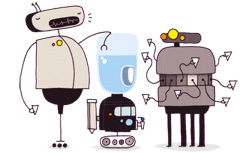Will Robots Steal Your Job?
Let us know what types of work are most vulnerable to automation and which will remain for humans only.
According to one of the constantly shifting timelines in the Terminator franchise, the artificial intelligence network Skynet began its attack on humanity last week, on April 21, 2011. It was a military operation—Skynet, a system originally commissioned to remove human error from military operations, was eventually given control of the entire U.S. Armed Forces. Predictably, it became "self-aware," deduced that humans were its enemy, and launched nuclear missiles at hundreds of cities around the globe.
In predicting a coming showdown between humans and computers, Terminator and countless other sci-fi flicks aren't wrong—they're just a little overdramatic. The real war will be about money, not military power, and instead of Skynet's cavernous lair, it will play out in quiet office buildings across the globe—office buildings just like your own. The real war, in other words, will be for jobs.
In the coming months, I will chronicle that war. Computers have made astonishing progress at acquiring what we've long considered fundamentally human capabilities. Machines are beginning to understand language. They can listen, they can speak, they can read, and they may even be able to write. They're getting better at visual pattern recognition; computers can tell the difference between your face and your dad's face, and they may be able to look at a biopsy slide and tell the difference between a cancerous cell and a healthy one. Computers might be able to "reason" the way humans can. Perhaps they'll soon sit in judgment when you appeal your traffic ticket.
I'm going to be writing a series of articles on the way robots are infiltrating our workplaces. What kinds of jobs are most vulnerable to robots, and which jobs will remain impervious to automation? Should we be happy about the robots—after all, they'll probably make our jobs easier; George Jetson worked just nine hours a week—or should we be really, really worried? And if the robots are coming, should we try to stop them?
At the outset of this project, I'm looking to talk to a wide range of people about their jobs and their concerns, if any, about robots. I'd appreciate if you could spare a couple of minutes to take a brief survey about your work and your thoughts about automation. I'd love to hear from all kinds of people, but I'm particularly interested in jobs that economists call "high-skilled"—doctors, lawyers, teachers, screenwriters, and others that require years of training, or that seem fundamentally beyond the scope of machines.
The survey allows you the option of remaining anonymous, but I'd also love to interview some of the respondents—if you're up for that, please let me know in the survey. You can also send me your thoughts without taking the survey by e-mailing farhad.manjoo@slate.com.
